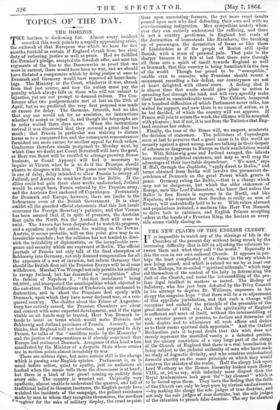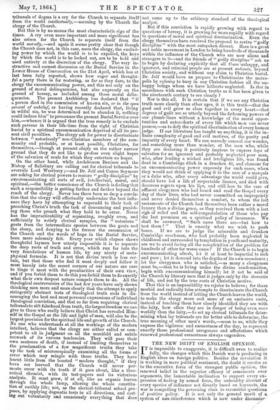THE NEW CLAIMS OF THE ENGLISH CLERGY.
IT is impossible to watch any of the stirrings of life in the Churches of the present day without being struck by the increasing difficulty that is felt in adjusting the relations be- tween them and what they call "the world." Especially is this the case in our own national Church. It appears in per- haps the least complicated of its forms in the cry which is now being raised, and which is echoed we see by at least one of the Bishops, for so-called "spiritual tribunals," which may rid themselves of the control of the laity in determining the faith of the Church, and resist the intcrineddling of the pro- fane legal intellect in matters so sacred. The Bishop of Salisbury, who has just been defeated by the Privy Council in his attempt to deprive Dr. Williams, expresses to his clergy the sanguine hope "that there will be a re-adjustment of this appellate jurisdiction, and that such a change will recognize and embody the principle of the preamble of the great statute of 1532, viz., that the spirituality of England is sufficient and meet of itself, without the intermeddling of any exterior person or persons, to declare and determine all such doubts and to administer all such offices and duties as to their rooms spiritual doth appertain." And the Oxford Declaration puts it beyond doubt that this wish does not merely represent the mortified vanity o a defeated prelate, but the uneasy conviction of a very large part of the clergy of the Church of England that there is a real humiliation in being subject to the judicial authority of men who have made no study of dogmatic divinity, and who construe ecclesiastical formulre exactly on the same principle on which they would construe the statutes of the realm. Half the clergy look upon Lord Westbury as the Roman hierarchy looked upon Henry VIII., or, let us say, with infinitely more disgust than the Royal Academicians look upon the "lay element" which is to be forced upon them. They have the feeling that the faith of the Church can only be kept pure by clerical exclusiveness, —by making the clergy the sole judges of true doctrine, and not only the sole judges of true doctrine, but the sole judges of the intention to preach false doctrine. The cry for classical tribunals of dogma is a cry for the Church to separate itself from the world intellectually,:—meaning by the Church the clergy of the Church.
But this is by no means the most characteristic sign of the times. A cry even more important and more significant has also arisen for the Church to separate itself from the world morally,--and again it seems pretty clear that though the Church does not, in this case, mean the clergy, the exclud- ing power by which the world is to be expelled, the keys by which the world is to be locked out, are to be held and used entirely at the discretion of the clergy. The very in- structive and earnest discussion on the Burial Service in the Lower House of Convocation on the 21st April, which has at last been fully reported, shows how eager and thought- ful a party there is for restoring, as far as they dare, to the clergy the excommunicating power, and this not only on the ground of moral delinquencies, but also expressly on the ground of heresy, as included among those moral delin- quencies. The present Archbishop has declared that "if a person died in the commission of known sin, or in the open avowal of unbelief, or having recently declared that, living in wilful sin, he was determined not to abandon it, nothing could induce him" to pronounce the present Burial Service over him,—whence it is argued that the true remedy is to exclude such persons in their life-time from the right of Christian burial by a spiritual excommunication deprived of all its pre- sent civil penalties. The clergy ask for power to discriminate between "notoriously" non-Christian members of the com- munity and probable, or at least possible, Christians, for themselves,—though at present chiefly on the rather narrow ground that they do not like to profess even slight hopes of the salvation of souls for which they entertain no hopes.
On the other hand, while Archdeacon Denison and the Bishop of Salisbury are calling out for clerical tribunals to overrule Lord Westbury ;—and Dr. Self and Canon Seymour are asking for clerical powers. to restore "godly discipline" by excommunicating all sorts of evil, intellectual, moral, and spiritual,—the better conscience of the Church is feeling that such a responsibility is getting farther and farther beyond the reach of the clergy. Never has there been so deep a convic- tion that the clergy will effectually undermine the best influ- ence they have by attempting to superadd to their task of preaching Christ's truth the task of denouncing and punish- ing those who preach what they hold to be error. Never has the impracticability of separating, roughly even, and sufficiently to satisfy clerical scruples, the "notorious " goats from the intermediate species between the goats and the sheep, and denying to the former the communion of the Church and the words of hope in the Burial Service, been more solemnly felt. Every year which elapses shows thoughtful laymen how utterly impossible it is to separate the deep roots of truth and error, which run far into the very foundations of human life, by any nicety of meta- physical formulae. It is not that divine truth is less cer- tain, but that those who feel it most deeply and follow it most keenly into the secret corners of our nature are sure to tinge it most with the peculiarities of their own view, and if you forbid them to do this you forbid them to do exactly what their own deepest nature compels them to do. All the theological controversies of the last few years have only shown thinking men more and more clearly that the attempt to apply stringently abstract tests of theological truth ends in dis- couraging the best and most personal expressions of individual theological conviction, and that so far from requiring clerical tribunals to sift falsehood from truth, the largestfreedom we can give to those who really believe that Christ has revealed Him- self in the Gospel as the life and light of man, will also be the largest provision for the spiritual life and growth of the Church. No one who understands at all the workings of the modern intellect, believes that the clergy are either called or com- petent to sit in judgment on all the manifold and subtle network of its various tendencies. They will pass their own sentence of death, if instead of limiting themselves to the proclamation of a few magnificent truths they take up the task of microscopically examining all the forms of error which may mingle with those truths. They have learnt little from the boasted "modern thought," if they have not learned that the Church will never per- meate error with its truth if it goes about, like a theo- retical chemist, with its test-papers and its victorious analysis. It must grow, if at all, like an organic leaven through the whole lump, altering the whole constitu- tion of earthly life•' not, as the clerical-tribunal school pro- poses, by applying dogmatic tests in all directions, and cast- ing out voluntarily and consciously everything that does not come up to the arbitrary standard of the theological analyst.
But if this conviction is rapidly growing with regard to questions of heresy, it is growing far more rapidly with regard to questions of moral and spiritual discrimination. Even the clergy themselves have received the proposal to revive "godly discipline" with the most outspoken dissent. Here is a great and noble movement in London to bring hundreds of thousands within the influence of the Church who are now aliens and strangers to it—and the friends of "godly discipline" ask us to begin by declaring explicitly that all these unhappy, and ignorant, and criminal people are at present outcasts, beyond Christian society, and without any claim to Christian burial.
Dr. Self would have us prepare to Christianize the metro- polis by refusing to bury in any Christian fashion all the un- happy beings whom we have hitherto neglected. Is that in accordance with such Christian truths as it has been given to the nineteenth century to see clearly ? Nor is this all. It is certain that if we see any Christian truth more clearly than other ages, it is this truth—that the good and evil grow so close together in every heart—that degrees of guilt are so utterly beyond the fathoming powers of our plumb-lines without a knowledge of the moral oppor- tunities and antecedents of every life which man can never possess,—as to defy the spiritual discrimination of every human judge. If our literature has taught us anything, it is the in- finite complexity of good and evil motives, of the purity and impurity of every heart. We can scarcely conceal our wonder, and something more than wonder, at the men who, while they are declaring it positively impious to express hope of salvation for an ignorant and probably neglected poor man, who, after leading a wicked and irreligious life, was found dead in a Cambridge ditch in a drunken fit, and clamour for an excommunicating power expressly for such cases, when they would not think of applying it to the case of a marquis or a duke who, after every advantage the world could give, should have led a life of respectable licence, and died with decorous regrets upon his lips, and still less to the case of affluent clergymen who had heard and read the Gospel every day of their lives, who had never committed an impropriety and never denied themselves a comfort, to whom the last sacraments of the Church had themselves been rather a moral luxury than a divine grace, as they received them with a last sigh of relief and the self-congratulation of those who pay the last premium on a spiritual policy of insurance. We shall be answered, "Such cases there are—but how to test them ? " That is exactly what we wish to push home. If we are to judge the miserable and drunken Cambridge coachman, who had probably been neglected in childhood and surrounded by temptation in youth and maturity, are we to avoid facing all the complexities of the problem for hundreds of other far worse cases ? If the Church is to begin excommunicating afresh, let it at least be impartial to rich and poor ; let it descend into the depths of its own conscience ; let the clergyman who is satisfied,—as many a clergyman must be,—that he is living under the divine condemnation, begin with excommunicating himself; let it not be said of the Church by literary men that it judges only by the decencies of life, and not by the true roots of Christian motive.
That this is an impossibility we rejoice to believe; for these morbid and radically false attempts to discriminate the Church from the world instead of letting the Church leaven the world, to make the clergy more and more of an exclusive caste, instead of teaching them how closely identified they are with the laity, how often they are in danger of being even mote worldly than the laity,—to set up clerical tribunals for deter- mining what lay tribunals are far better able to determine, the true meaning of other men's words,—seem to us, while they express the vigilance and earnestness of the day, to represent exactly those professional arrogances and affectations which renewed professional earnestness always engenders.































 Previous page
Previous page